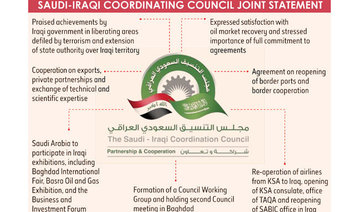BAGHDAD: US Secretary of State Rex Tillerson urged the Iraqi government and the Kurdistan region on Monday to resolve their conflict over Kurdish self-determination and disputed territories through dialogue.
Tillerson made the call at the start of a meeting in Baghdad with Iraqi Prime Minister Haider Al-Abadi, who in turn defended the role of an Iraqi paramilitary force backed by Iran against the criticism made by Tillerson on Sunday.
“We are concerned and a bit sad,” Tillerson said in his opening remarks. “We have friends in Baghdad and friends in Erbil and we encourage all parties to enter into discussion... and all differences can be addressed,” he said, referring to the Iraqi and Kurdistan region capitals.
The US administration sided with Al-Abadi in rejecting the validity of the referendum held last month in the Kurdish region, which produced an overwhelming yes for Kurdish independence.
The administration also called on the two sides to avoid further escalation, after the Iraqi prime minister retaliated against the vote by isolating the Kurdistan region and ordering his troops to seize Kirkuk from Kurdish fighters.
"We don’t want to enter into any battle against any Iraqi component,” Al-Abadi said. “When we entered Kirkuk we sent a clear message that the citizens of Kirkuk are important to us.”
It was Tillerson’s second meeting with Al-Abadi in as many days. After Sunday’s meeting, alongside Saudi Arabia’s King Salman, Tillerson said it was time for Iranian-backed militias that had helped Baghdad defeat Daesh to “go home.”
Al-Abadi told Tillerson the paramilitary force called Popular Mobilization “is part of the Iraqi institutions,” rejecting accusations that it is acting as Iran’s proxies.
“Popular Mobilization fighters should be encouraged because they will be the hope of country and the region,” he said.
A few hours earlier, Al-Abadi’s office published a statement rejecting Tillerson’s comments. “No party has the right to interfere in Iraqi matters,” it said.
Tillerson urges Iraq, Kurds to resolve conflict through dialogue
Tillerson urges Iraq, Kurds to resolve conflict through dialogue













